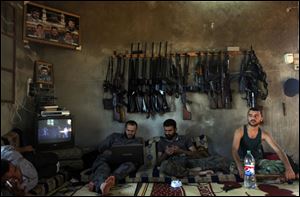
U.S. accuses Russia of arming Syrians
Top U.N. peacekeeper says nation in civil war
6/12/2012
Syrian rebel soldiers wait in a house on the outskirts of Aleppo, the nation's largest city. Escalating violence has prompted calls from the U.N. special envoy for influential nations to 'twist arms' to end the conflict.
BEIRUT -- U.S. officials accused Russia Tuesday of escalating the Syrian conflict by supplying attack helicopters to President Bashar Assad's regime as international cease-fire monitors in Syria aborted a fact-finding trip when they came under assault by an angry mob and gunfire.
Meanwhile, the United Nations' top peacekeeping official acknowledged for the first time Tuesday that Syria is in the midst of a civil war.
"Clearly what is happening is that the government of Syria lost some large chunks of territory, several cities, to the opposition and wants to retake control," the official, Herve Ladsous, told the Reuters and Agence France-Presse news agencies.
Asked whether the conflict could be characterized as a "full-scale civil war," he answered: "Yes, I think we can say that."
U.S. Secretary of State Hillary Clinton made her accusation about Moscow arming the Assad regime during a forum in Washington.
"We are concerned about the latest information we have that there are attack helicopters on the way from Russia to Syria, which will escalate the conflict quite dramatically," Mrs. Clinton said.
There was no immediate reaction from the Russian Foreign Ministry.
Moscow insists that any weapons it supplies to its Damascus ally are not being used against anti-government demonstrators in the 15-month-old uprising.
The U.N. observers were not hurt as they were turned back by the assault on their vehicles by an angry crowd near the town of Haffa, the United Nations said. The source of the gunfire was not clear. Activists blamed regime loyalists for the attack. The violence raised questions about the ability of about 300 unarmed monitors to provide a useful assessment of the situation.
"All U.N. observers are now back at their bases and are secure," said Sausan Ghosheh, a spokesman for U.N. observers in Syria. U.N. observers have seen a steep rise in violence and a dangerous shift in tactics by both sides in Syria in the last five days, the spokesman, Kieran Dwyer said.
He said the Syrian government, intent on regaining control of rebel-held areas, is shelling heavily populated districts and using attack helicopters over cities "with devastating impact on civilians."
The opposition, in turn, is increasingly coordinating attacks against government forces and civilian infrastructure, and "the conflict has reached all parts of Syria virtually," he said.
The U.N. observers have been prevented from entering other areas besides Haffa.
Last week, it took days for the monitors to reach Mazraat al-Qubair, where nearly 80 people were reported slain, because government troops and residents blocked them.
As the conflict escalates, regional power brokers from Iran to Turkey risk getting drawn into the fight.
Diplomatic hopes have rested on Russia -- Syria's most important ally and protector -- agreeing on a transition plan that would end the Assad family dynasty, which has ruled Syria more than four decades.
But Moscow has rejected outside forces to end the conflict or any plan to force regime change in Damascus.
The United Nations' special envoy on Syria, Kofi Annan, asked governments with influence to "twist arms" to end the bloodshed.
But there are few signs the diplomatic pressure is having any measurable effect.
"The longer this violence continues, the more dangerous it becomes not only for the country and the Syrian people but the region," Mr. Annan's spokesman, Ahmad Fawzi, said in Geneva.
"It's dangerous and the red light is flashing," he said.
The deteriorating situation in Haffa has raised alarm in the past eight days. Officials in Washington said Monday that regime forces may be preparing a massacre in the village, which is about 20 miles from Mr. Assad's hometown of Kardaha along the Mediterranean coast.
Activists said government forces were firing mortar rounds into the village.
Calls to the area did not go through Tuesday.
The state news agency SANA blamed the Haffa violence on terrorists -- the term it uses to describe rebels -- who had attacked residents in the village.
The Assad government came under new criticism in an annual report by the United Nations about children in armed conflicts, which included a grim section on Syria.
It said Syrian forces and plainclothes militiamen known as shabiha had used children as young as 8 as shields to insulate soldiers from rebel assaults. The report also accused those forces of torturing and molesting boys as young as 9 and said children had been maimed and killed in attacks on civilian areas.
It was based on interviews with witnesses, victims, and former members of the Syrian army, conducted between March, 2011, when anti-government protests began, and the first months of 2012.